Need help developing self discipline in students? Want to know how parents and teachers can help students develop self discipline?
Do you find it hard to be disciplined when being implemented practically? If yes, worry not. You are not only the one to feel or think in that way. As per the survey, 27% of adults think they are not self-disciplined enough to improve their lives or make healthy changes in their lifestyles.
Thus, we people, every day deal with distractions, struggle to concentrate and do our best not to procrastinate. Learning to lead yourself effectively and others such as happiness, academic success, and fulfillment stem from focus and self-control all come down to discipline.
It may be hard to believe for some people, but yes, people with self-discipline are happier, as this study shows. How? Because with self-discipline and self-control, we can easily accomplish more of the goals we truly care about. Self-discipline acts as a bridge between goals defined and goals accomplished.
People with a high sense of self-discipline and self-control tend to spend less time debating whether to indulge in behaviors or activities that do not go with their targeted goals or values. They are more decisive and don’t let impulses or feelings dictate their mindset.
Self-disciplined people are the architects to design and develop their own beliefs and actions to make their goals a reality. Thus, such people aren’t as easily lured and often feel more satisfied and happy with their lives.

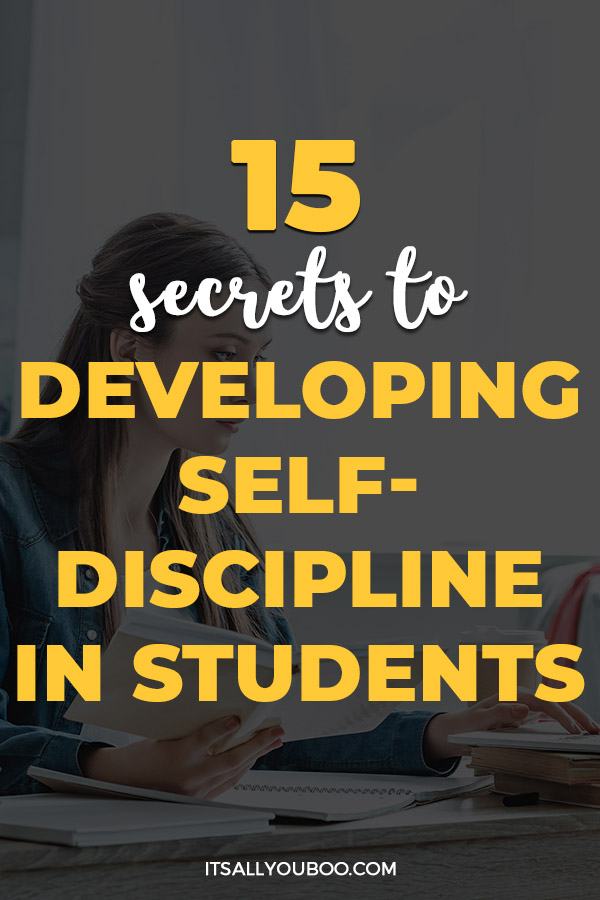
THIS POST MAY CONTAIN AFFILIATE LINKS.
IF YOU MAKE A PURCHASE FROM THESE LINKS, I MAY EARN A SMALL COMMISSION.
CLICK HERE FOR MY FULL DISCLAIMER STATEMENT.
Students Do Not Develop Self Discipline On Their Own
Parents and schools play an important role in helping their children to maintain self-discipline. in some cases, children/students are unaware of the true meaning of being self-discipline and are often make mistakes or become too harsh on themselves in the name of self-discipline.
On the other hand, some students think maintaining their behavior only in the real world is self-discipline and think they can do anything online. There can be the case where students can misuse the school’s facility of the internet. So, many schools start to block everything like social media to protect their students from the online world and only give access to certain useful sites.
Now the question is: What is self-discipline, and how does it work? Many of us feel we don’t have enough of it or desire to improve it, but how can we do that? If you are also one of them seeking the answer to all these questions, here is the article for you.
Let’s begin with a definition of self-discipline and explore its importance in people’s lives.
What is Self-Discipline for Students?
Self-disciplined people are those who have the ability to control and make themselves work harder or behave in a particular way by themselves without needing others to tell them what to do. In short, it is the continuous correction or regulation of oneself for the sake of improvement.
It is an invaluable skill that everyone should learn and develop over their life which will help them tremendously throughout their livelihood. As a student, self-discipline is a must to achieve the desired marks. Undoubtedly, it helps students throughout their academic careers.
For instance, there will always be subjects for a student that you do not love or attend, and it may create a distraction in your life; this is why it is so important to develop the self-discipline to succeed through those times of less motivation.
👉🏽 RELATED POST: Top 10 Goals for School
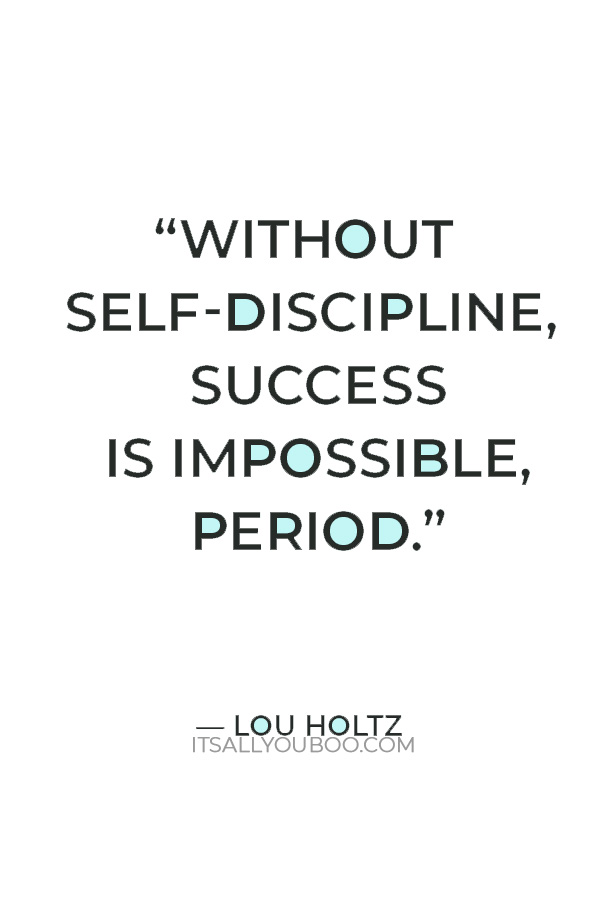
As per the American Psychological Association, the key characteristics of self-discipline that psychologists have been used are listed below:
- The ability to put an end to the impulsive response that may harm our commitment
- The ability to delay our gratification and hold out against short-term temptations to meet the longer-term goals.
It is okay if you lack self-discipline or do not try hard to be self-disciplined because everyone does. Discipline is the thing that does not come naturally to you. You have to find ways and cultivate strategies.
Why is Self-Discipline Important in Students?
From the above, you have already known that self-discipline refers to regulating ownself, making a correction own thoughts, and improving behaviors of own. Self-discipline in students is a must and a crucial part of the journey. We, as students, need to attend class, prepare for the examination, submit the assignments before deadlines, and balance social life and student life. These all activities require us to be self-disciplined to achieve them all.
For students, being self-disciplined is extremely important, especially in college, because college is where we need too much of our learning on our own. College is a less structured and less guided educational institution than high schools.
Developing self-discipline in students is very important as it helps students to:
- Set and achieve their goals,
- Gain the ability not to give up easily,
- Habe self-control and strengthens the inner strength,
- Stick with your own decision and not to lose sight of targeted goals.
Also, self-discipline and self-control can play in:
- Reducing the risk of obesity.
- Developing higher impulse control and the ability to delay gratification.
- Lowering the likelihood of engaging in criminal activities.
- Creating greater occupational and career achievements in terms of job and income.
So the question is, how can we develop self-discipline in students? In the next section, the article has covered some useful and helpful ways to develop discipline in students.
👉🏽 RELATED POST: Examples of Academic Goals for College

15 Secrets to Developing Self-Discipline in Students
As a parent or a teacher use these discipline tips to give yourself a foundation for teaching self-discipline. Visit the related articles throughout to learn more strategies.
#1. Know Your Weaknesses and Strengths
We all have our weaknesses and strengths. Knowing your weaknesses and strengths means that you are aware of your uniqueness and needs. If you always wish to avoid attending maths class but prefer to be a part of sports class or recognize which subject you enjoy the most and which you do not, you can start to make strategies for self-discipline.
Instead of avoiding attending the very important class, you feel less interested in; you need to start making a plan that limits your distraction, increases the reward system for yourself, and includes non-negotiable study time in your weekly schedule.
Plus, you can enlist help from a tutor or teacher in the subjects you are struggling in. Ask for help, this is the first step in supporting your weaknesses.
#2. Eliminate Distractions
The first and foremost thing we need to do when building self-discipline is to eliminate distractions. For this, we first need to identify the causes of distractions in our life. If we identify the distraction, we can demonstrate our awareness of them.
The very common distraction that affects many students is smartphones and social media. We may end up messaging our friends or just scrolling up the feed while studying to find the latest happenings in the friend’s life or the world.
And, if one wants to eliminate such distraction when building self-discipline, the only advice is to put the smartphones in “Do not disturb” or “Airplane” mode while working on a task. You can reward yourself with some screen time after completing a school task.
👉🏽 RELATED POST: How to Protect Your Eyes in College

#3. Make Use of Technology
Making a list of to-do things in a paper is easier, but remembering them on time is difficult. Many of us think having a proper set of to-do tasks scheduled is all about self-discipline, but you are mistaken. Self-discipline is when you complete all the to-do tasks at their respective scheduled time.
But, many of us struggle to remember the tasks at the scheduled time. Thus, we can utilize the features of advanced technology. We can use technology to set reminders that help us stay self-disciplined.
Moreover, you can also set the time limit before browsing the website. By doing so, you would not get overly distracted by website browsing and forget the things that you need to do over that time. You can also make use of technology to monitor your online presence time.
#4. Get Better at Time Management
Getting better at time management helps you limit procrastination and stress, help you to achieve your goals, and make your free time more productive and enjoyable. How? Because you won’t be worried about the things to be done in time.
If you are a pro in time management, you can easily schedule tasks, knowing how long they take and accounting for enough time to complete them.
As a student, many tasks need to be done between classes, preparing for exams, doing assignments, reading books, and making time for ourselves. And if you can put some effort into mastering the time management skill, you are one step closer to increasing your self-discipline as a student.
#5. Start Doing Small Things that You Dislike
There is no debate that willpower is an important part of being self-disciplined in students. After all, studying requires a lot of effort, focus, and patience. It does not come all naturally. You have to work on it.
For instance, if you do not like reading some “XYZ” subject, make a rule that you start reading or practicing that particular subject at least half an hour a day and slowly increase the time. Besides this, you can also slowly start doing the things such as
- cleaning the room,
- making your bed,
- reading books instead of watching videos online
Note: if you do all these things yourself, you are on the right path in building your self-discipline. If you do not, it is not that late. You can start doing and work on increasing self-discipline yourselves.
👉🏽 RELATED POST: SMART Goals for College Students
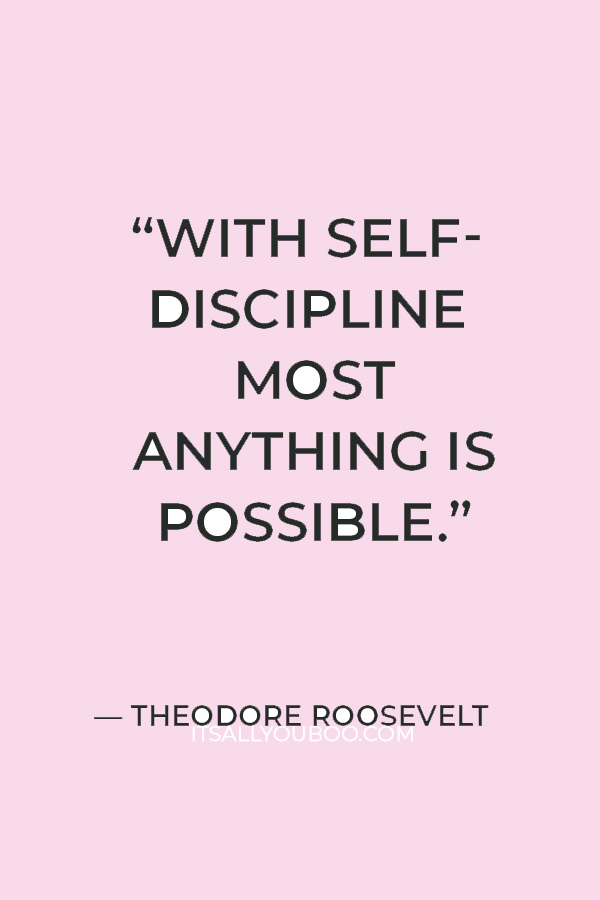
#6. Be Specific About the Task that You Plan to Complete Each Day
When you set goals for each day or each week, make sure you complete all of them. Also, make sure you set realistic goals only; otherwise, expectation hurts. Being very specific to complete the tasks you have planned is extremely important to be self-disciplined.
For example, if you had set a goal of studying chemistry in a day, it may be vague. You may read some pages of the chemistry book and start to feel bored. Why? Because you have set unrealistic goals. How can one study the whole book completely in a day? Instead, you can make specific goals such as reading chapters 3 and 4 of chemistry in a day.
#7. Start Small and Be Consistent
If you have heard of having trouble being self-disciplined, it is best to start with the small changes. For instance, if you could promise yourself to study 15 minutes a day daily, you will be more confident in being more disciplined. Soon you can step it up to 20/30 minutes to 1 hour each day.
So start making a smaller commitment and build on your progress on every commitment. In this way, you can become more disciplined as a student.
Don’t wait until the September or January semester to start, choose a small task and begin now.
#8. Stay Positive
Negative thinking or talking reflects negativity in your behaviors. Many students often say that they find it difficult to be disciplined, or they are demotivated, or they are procrastinators. If you also repeatedly say the same things, you will also come to believe in them, making it even more difficult to change your behavior.
So even if you are falling behind or not doing well, do not lose hope. If you are losing hope or getting distracted by your action again and again, then challenge yourself and push yourself beyond, stay positive, and use your mistakes to your advantage.
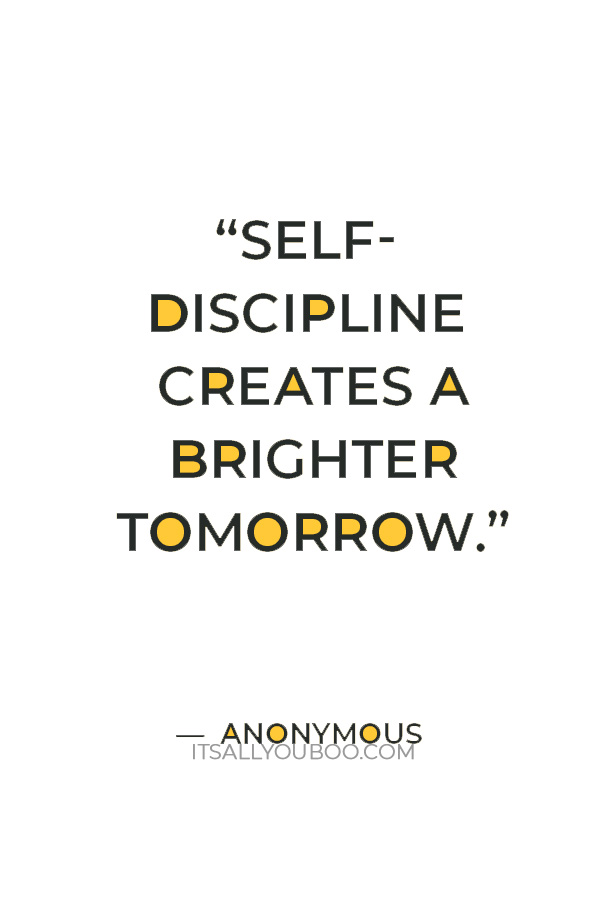
#9. Think About What Has and Has Not Been Working for You
Another tip for developing self-discipline in the students is knowing when you are most productive. If you have no clue about it, try to answer the below-mentioned questions and analyze yourself. The questions are listed below:
- According to you, what kind of environment do you prefer for studying?
- Do you still stay focused if there is any noise in the background?
- Which time in the day do you find it easiest to concentrate on reading?
- Do you find reading more productive from pdf or screen, or do you prefer handwritten notes?
- Are you able to remember the points quickly when reading the notes, or do you prefer watching tutorials videos?
- Do you prefer studying one subject a day intensively or different subjects for a certain time in a day?
When you discover your own preferences, you can use them as an advantage to develop self-discipline in yourself.
#10. Create a Routine
Another best way to develop discipline in the students is by creating a routine. It is one of the best tips for staying self-disciplined for the students. Creating a routine for your day will help you be consistent with your daily work.
Once you become consistent with your daily routine, it becomes effortless, and you won’t need to think of it. Remember that your goal to be consistent with your daily routine is to help you to stay self-disciplined in reaching your main goals.
After your daily action behind daily habits, you’ll have to rely less on willpower and more on automation.
#11. Remove All Distractions, Before You Start Your Work
It is better to remove all the distractions from around you. You can not expect to study effectively when there is a distraction. For instance, if you are about to do your homework, kindly remove all the devices from around you; otherwise, after some time, you may end up scrolling your feed instead of studying.
Similarly, if you use a laptop or PC to study online classes or research the internet, try opening each resource in a new window to stay focused, and deactivate all the emails and browser notifications. Many different apps are available in the market, such as Rescue Time, that helps you maintain a distraction-free environment.
#12. Write Down Why You Want to be a Disciplined Student
If you are trying to be disciplined just to show other people or your teacher/parents said “be a disciplined person,” you are just fooling yourself and others by acting as a disciplined student.
To be a disciplined student, you must have a clear vision of why you want to study hard and for whom. If your answer is “for parents” or “for teachers,” then you can not be self-disciplined from within your heart.
But if you are serious about self-discipline, try to focus on how you want to develop as a person rather than the end result. By doing so, you will develop a deeper motivation and determination to be a disciplined person.
👉🏽 RELATED POST: Daily Routine Schedule for College Students
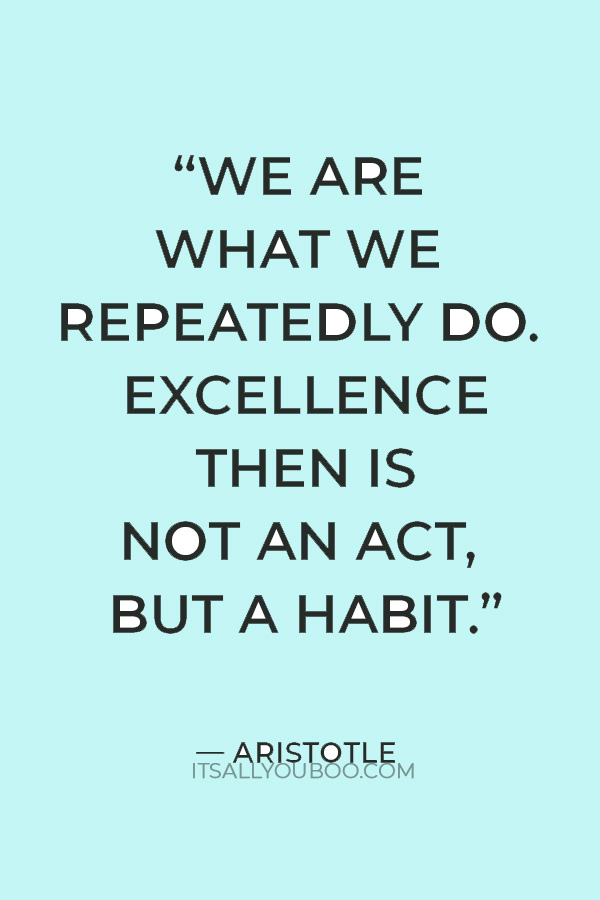
#13. Exercise Regularly
Unhealthy health habits and laziness are the major barriers for a person in being self-disciplined. Although students follow all the tips and make a routine every day, they might feel lazy or procrastinate when the time comes to conduct the tasks.
Thus, exercising daily helps the person be very active throughout the day. Also, aerobic exercise helps you stay focused during study sessions. It also helps to improve the connections between existing brain cells.
#14. Take a Break
Take a regular break if you find it hard to study for so long. By doing so, our brain is also not wired to focus on the same tasks for a longer period of time. But there can be a chance of students being distracted when taking a break.
So, you can make a rule on how you schedule your break between your study time as per your comfort. In my case, I would take 5 minutes to break in every one hour of studying straight. By doing so, I am only half an hour on a break during the whole 6 hours of study time.
You can make use of the Pomodoro technique for studying to help you focus and take regular breaks.
#15. Remember There is No Perfect Time for School Work
One thing that stops students from self-discipline is the belief that it is not a perfect time to start the tasks. Such belief only leads to being a procrastinator rather than a self-disciplined person because you keep on waiting for the perfect time to start your study session.
There is no perfect time to start your work, however. If you wait for the right moment, you probably won’t get your tasks done until it’s too late. Be flexible and make use of any moment you have to study, whether it’s 10 minutes or 10 hours.
👉🏽 RELATED POST: Healthy Habits for Students

Top Questions About Students and Self-Discipline
#1. How can teachers help students develop self-discipline?
Teachers can help students develop self-discipline by empowering them through self-monitoring their own behaviors. Further, teachers can also explain why, give consequences, and praise and reward their good behaviors.
#2. How do you develop and practice self-discipline?
To develop self-discipline, we must be sure of why we want to be disciplined, plan the task, and schedule the time accordingly. Also, we need to identify the obstacles and make strategies to deal with them in advance. Find the motivation and monitor our behavior regularly by ourselves.
#3. What are the 3 types of self-discipline?
The main three types of self-discipline are active, reactive, and proactive discipline.
- Active discipline refers to doing what you need to do at that very moment such as eating healthy meals and avoiding distractions while reading or studying.
- Reactive discipline refers to controlling your thoughts and behavior when facing unforeseen situations such as dealing with a rude person.
- Proactive discipline refers to doing things in advance to better control a situation, such as creating a to-do list.
#4. What is self-discipline in learning?
Self-discipline in learning refers to keeping yourself focused on your assignments or in classes, not getting distracted by others during the lecture or during the time of the study, and making sure you complete your assignment before deadlines.
#5. Why is self-discipline important to success?
Self-discipline is important to success because it helps you stay focused on your targeted goals. It also enables you to control yourself and your reaction in every situation. Lack of self-discipline leads to a lack of self-esteem, which may be a barrier in your way to success.
Get Your SMART Goals Worksheet
Ready to set goals to become more self-disciplined? Sign up below to get your FREE SMART Goals Worksheet, form-fillable, and printable, and includes more examples to help you.
As a student, it’s up to you to decide why being self-disciplined is important to you. Yes, teachers and parents play a role in imparting the study habits and routines that develop self-discipline, but the commitment comes from the student.
Work with your support system, whether teachers, guidance counselors, guardians, or parents to build a plan for self-discipline. That way when you reach college, university, or even the workforce, you are self-sufficient in your discipline as well as motivation.
Your ability to set goals and meet them, says more about you than you’ll know. Start building self-discipline today.

How can parents and teachers develop self-discipline in students?

More About Guest Contributor
Alecia Carroll is a wife and mother of twins. She is a parenting expert, and her parenting journey led her to write content on parenting to help other parents with their children’s digital wellbeing.
Last Updated on December 19, 2024






